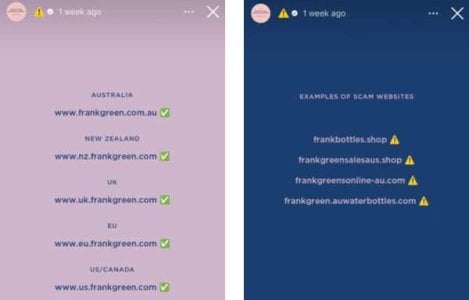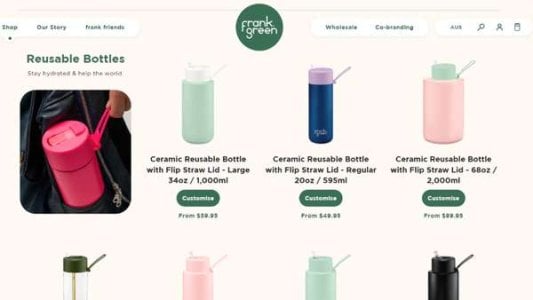Cruel Frank Green scam websites target Aussies
In today's fast-paced world of online convenience, we have the power to accomplish a wide range of tasks without even leaving our living rooms.
From paying utility bills to shopping for our favourite brands, the digital realm has become our very own magic carpet, whisking us away to our desired destinations with ease.
However, we must recognise that this digital landscape is not without its obstacles and uncertainties.
Recently, the popular drink bottle brand, Frank Green, has fallen victim to these deceitful practices.
Multiple convincing scam websites have been created to trick unsuspecting customers into divulging their card details.
An unfortunate incident was reported to SkyNews.com.au, where an anonymous source shared how she fell victim to an enticing social media advertisement offering a significant 50 per cent discount on Frank Green drink bottles.
The fraudulent website, www.salefrankbottles.com, mirrored the layout and high-quality product imagery of the legitimate Frank Green website.
Trusting the advertisement, she made a purchase totalling $60. However, her suspicions were aroused after receiving numerous suspicious emails, leading her to realise that she had been deceived.
She said, ‘I saw an ad on Instagram which showed Frank Greens at 50 per cent off, so I clicked on the link and got taken to a website that was not overly suspicious.’
‘I spent $60 on three bottles, the deal seemed legit as I knew Frank Green have recently changed their lids, and these bottles advertised had the old lids.’ she added.
Frank Green has taken a proactive approach to combat the rising threat of cyber fraud by issuing warnings through their media platforms and sharing tips with their loyal customer base.

Experts have stressed the importance of carefully examining URLs, ensuring they begin with 'HTTPS' to indicate a secure and safe online environment.
However, they also caution that even HTTPS sites may not entirely protect sensitive details from cunning website operators.
In addition to checking for HTTPS, there are several other precautions you can take to enhance your safety. Here are a few recommendations:

It's crucial to share our knowledge and insights to help others navigate the online landscape safely. Remember, staying informed and following best practices, like checking URLs and being cautious of unrealistic offers, can go a long way in protecting ourselves from scams.
Members, have you ever experienced something similar? We would love to hear your thoughts on this and any personal experiences you may have had.
From paying utility bills to shopping for our favourite brands, the digital realm has become our very own magic carpet, whisking us away to our desired destinations with ease.
However, we must recognise that this digital landscape is not without its obstacles and uncertainties.
Recently, the popular drink bottle brand, Frank Green, has fallen victim to these deceitful practices.
Multiple convincing scam websites have been created to trick unsuspecting customers into divulging their card details.
An unfortunate incident was reported to SkyNews.com.au, where an anonymous source shared how she fell victim to an enticing social media advertisement offering a significant 50 per cent discount on Frank Green drink bottles.
The fraudulent website, www.salefrankbottles.com, mirrored the layout and high-quality product imagery of the legitimate Frank Green website.
Trusting the advertisement, she made a purchase totalling $60. However, her suspicions were aroused after receiving numerous suspicious emails, leading her to realise that she had been deceived.
She said, ‘I saw an ad on Instagram which showed Frank Greens at 50 per cent off, so I clicked on the link and got taken to a website that was not overly suspicious.’
‘I spent $60 on three bottles, the deal seemed legit as I knew Frank Green have recently changed their lids, and these bottles advertised had the old lids.’ she added.
Frank Green has taken a proactive approach to combat the rising threat of cyber fraud by issuing warnings through their media platforms and sharing tips with their loyal customer base.

To assist customers in identifying scams and avoiding fraudulent websites, Frank Green has compiled a list of legitimate and fake website addresses. Source: Instagram/Frank Green
Experts have stressed the importance of carefully examining URLs, ensuring they begin with 'HTTPS' to indicate a secure and safe online environment.
However, they also caution that even HTTPS sites may not entirely protect sensitive details from cunning website operators.
In addition to checking for HTTPS, there are several other precautions you can take to enhance your safety. Here are a few recommendations:
- Check the website's URL for misspellings or unusual domain extensions, as scammers often create similar-looking URLs to deceive users.
- Verify contact information, including a physical address and phone number, to ensure the website has legitimate means of communication.
- Look for trust indicators like security badges or logos from reputable organisations, indicating that the website has undergone security checks.
- Read reviews and testimonials from other customers to gauge the website's credibility and reliability.
- Be wary of unrealistic offers or extremely low prices, as they could be signs of fraudulent schemes or counterfeit products.
Key Takeaways
- Popular drink bottle maker Frank Green has warned consumers about fake social media advertisements leading to scam websites.
- A number of customers have been conned by these scam websites, tricked into providing their card details and making fraudulent purchases.
- One of these fraudulent websites appears very similar to the legitimate Frank Green site and sells products at a discounted rate, making it appear as a legitimate offer.
- Despite a common belief that websites starting with 'HTTPS' are secure, cybersecurity experts warn that sensitive customer information can still be intercepted by the site's operator, even with this designation.
It's crucial to share our knowledge and insights to help others navigate the online landscape safely. Remember, staying informed and following best practices, like checking URLs and being cautious of unrealistic offers, can go a long way in protecting ourselves from scams.
Members, have you ever experienced something similar? We would love to hear your thoughts on this and any personal experiences you may have had.








